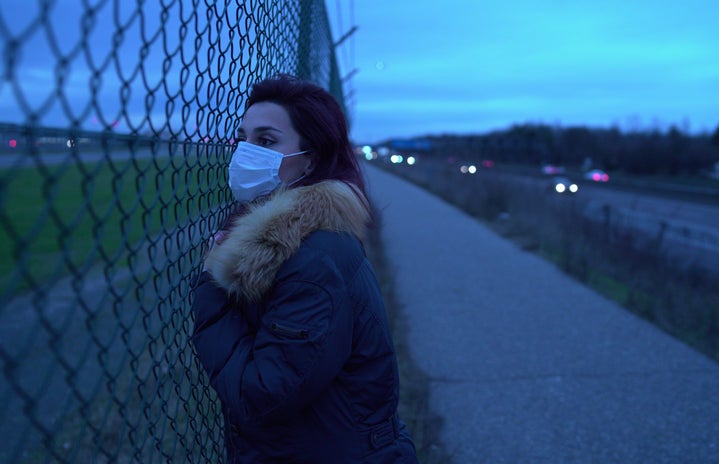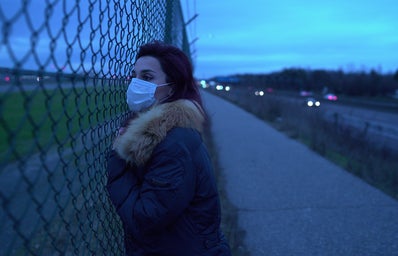On one of the last days of February, I met a group of classmates on the lawn in front of our library.
As the sun warmed the grass underneath us, we discussed our plans for our upcoming presentation on the defining moments of different American generations in America.
We glossed over the moments in history we already knew had an impact — World War II, the JFK assassination, 9/11. These events shifted entire generations’ views on the world just as they came of age.
At the end of our conversation, we were confident in our characterizations of past defining moments but found ourselves wondering about our own.
What was the event that would define our generation? Which event would make the world pause?
Our presentation was on March 11, two days after an email from the university suggesting all professors begin transitioning to online classes to minimize the spread of the coronavirus.
My friends and I debated the extent that we needed to take this seriously, whether it was “just the flu” or whether to vacate our apartments immediately.
My professor stood at the front of our classroom Wednesday morning and told us the many ways our lives would likely change in the coming days — online classes would be mandated, on campus events would be limited to 10 people.
She fielded questions about the possibility of campus shutting down entirely, commencement ceremonies being canceled.
Then my group and I stood in front of the class and shakily delivered the speech we had spent a week practicing.
As the uncertainty of the future hung over our heads, we told stories of the ways the generations before us were shaped by major historical events.
Meanwhile, in the back of our minds we wondered if the coronavirus would be the event that shaped our generation for years to come.
On the internet, we laugh about OK Boomer memes and roll our eyes at articles that scold Millennials for buying avocado toast.
But the Boomers we disparage online were kids once, too. Born between 1945 and 1964, they grew up in an era of peace and prosperity.
The earliest Boomers experienced a childhood marked by the stability and contentment of the ‘50s, in which a booming economy allowed Americans to ride a post-war high out to sprawling suburbs and consume more goods than ever before.
Yet, these early Boomers came of age into a national tragedy: President John F. Kennedy was assassinated.
While the entire nation mourned his loss, Boomers themselves experienced a loss of their own innocence.
Teens and young adults who had grown up confident that the world unequivocally rewarded good and condemned bad were suddenly confronted with the harsh reality that this was not always the case.
Of his death, politician Pat Moynihan said, “We’ll laugh again, but we’ll never be young again.”
9/11 brought a similarly harsh realization to Millennials, who sat in classrooms around the country as their teachers spoke in hushed tones and ushered early dismissals.
The date marked a day of darkness for all in America, but it was especially poignant for those whose innocence felt shattered.
The coronavirus has already been likened to such pivoting events in America’s collective memory.
Both Kennedy’s assassination and 9/11 issued a quiet across the country as many mourned the America they thought they knew — invincible, ever progressing.
But these moments were concise and contained.
Their effects on American culture were long lasting, but they were recognizable immediately.
With COVID-19, the changes come subtly, the realization of the extenuating circumstances are taking time to dawn: just last week, various college spring breakers continued to convene on public beaches, despite health officials insisting on the importance of social distancing.
“If I get corona, I get corona,” one spring breaker shrugged into a camera, insisting it would not stop him from partying.
Slowly, the news is trickling down. People are realizing the gravity of the situation. The college kid apologized for his words; streets get emptier every day.
Little by little, the country retreats, and individuals grapple with what it means to truly live in a global pandemic.
As the personal effects of the coronavirus set in, young people have found themselves looking closely at its political implications, as they did after JFK’s death.
As thousands of our own residents face the need for testing and symptoms that require hospital care, universal healthcare is proving to be more of a human right and necessity than ever.
And as office workers attend Zoom conferences in pajamas from their bedrooms while grocery store clerks and delivery drivers brace the front lines, more are realizing that workers previously termed “unskilled laborers” actually play essential roles in the economy.
These observations aren’t necessarily novel (Medicare For All was popular among the majority of Americans far before this pandemic), but young people specifically have begun to explicitly point out the absurdities of the current systems we operate within.
This week, conservative economists, politicians and our president alike have expressed immense frustration at the suffering of the economy under the measures taken to save lives.
On March 24, President Trump floated the idea of reopening the economy to save the stock market, saying “The cure [to the pandemic] cannot be worse than the problem itself.”
This conclusion recognized the limits of a society that revolves around the free market (“we can’t stop for three months!”) before it embraces these limits.
In the way our system currently exists, humans are subjected to the whims of the economy rather than accountable for how we treat each other.
At least now, people are starting to realize the way the two can be incompatible with each other.
After JFK was shot, the ‘60s devolved into a decade of counterculture, courtesy of the country’s youth.
While the assassination was far from the only reason this movement came to be, it may have been the catalyst.
So, who knows? Maybe all it will take to ignite the revolution is a global pandemic featuring elected officials vocally prioritizing the country’s GDP over millions of lives.


